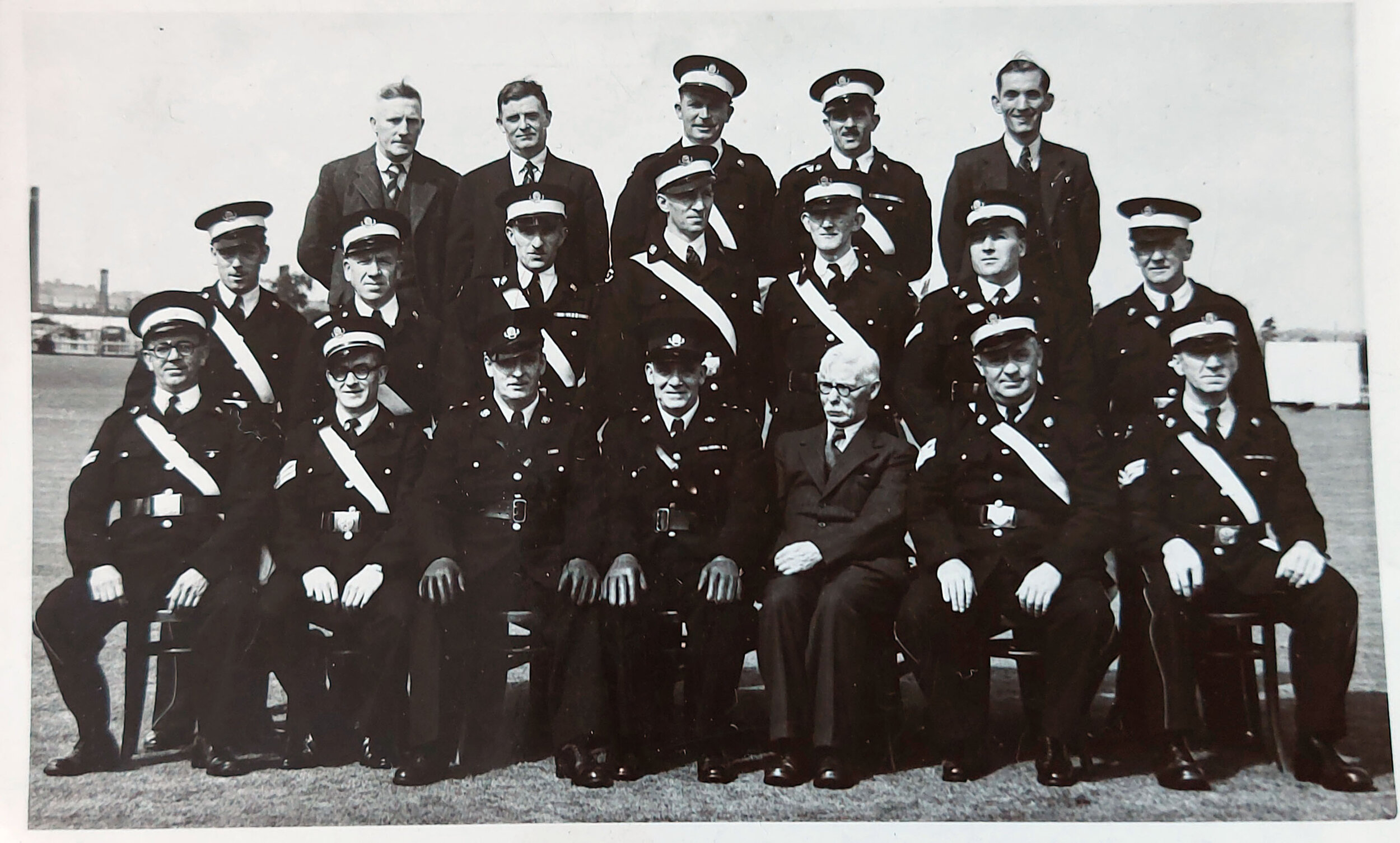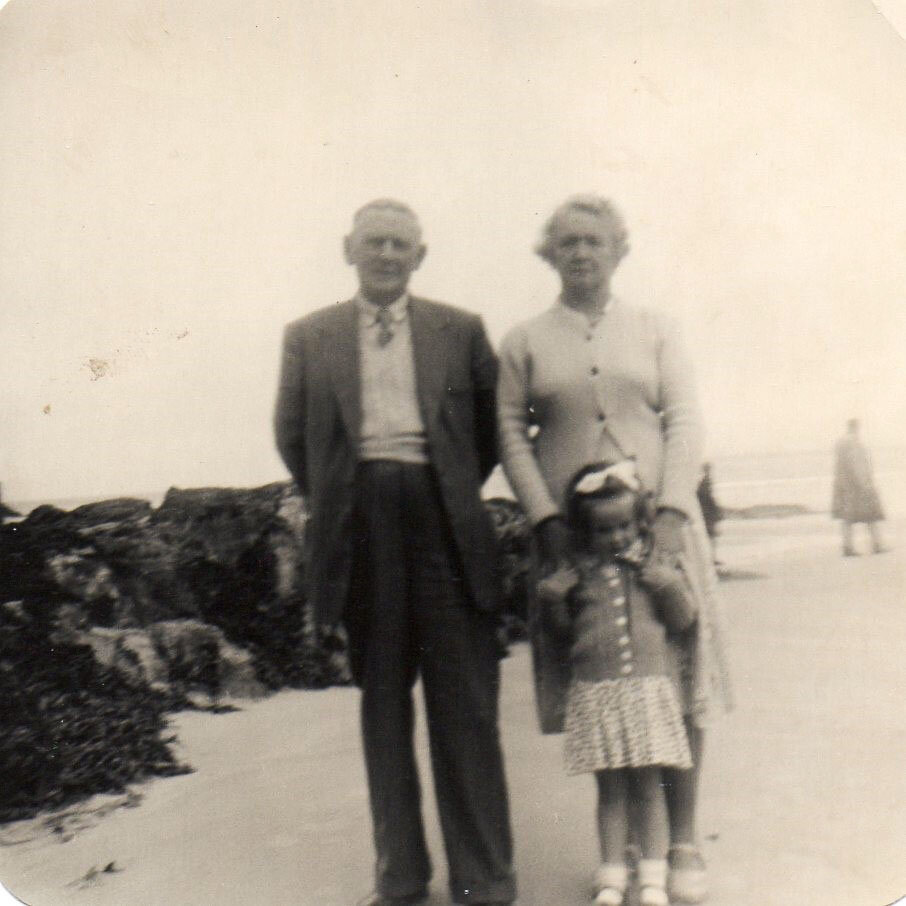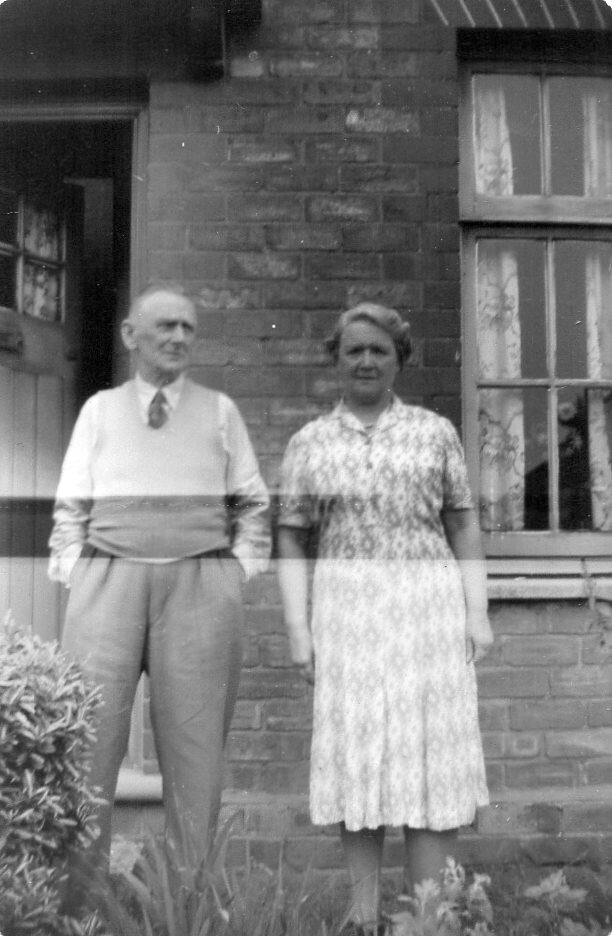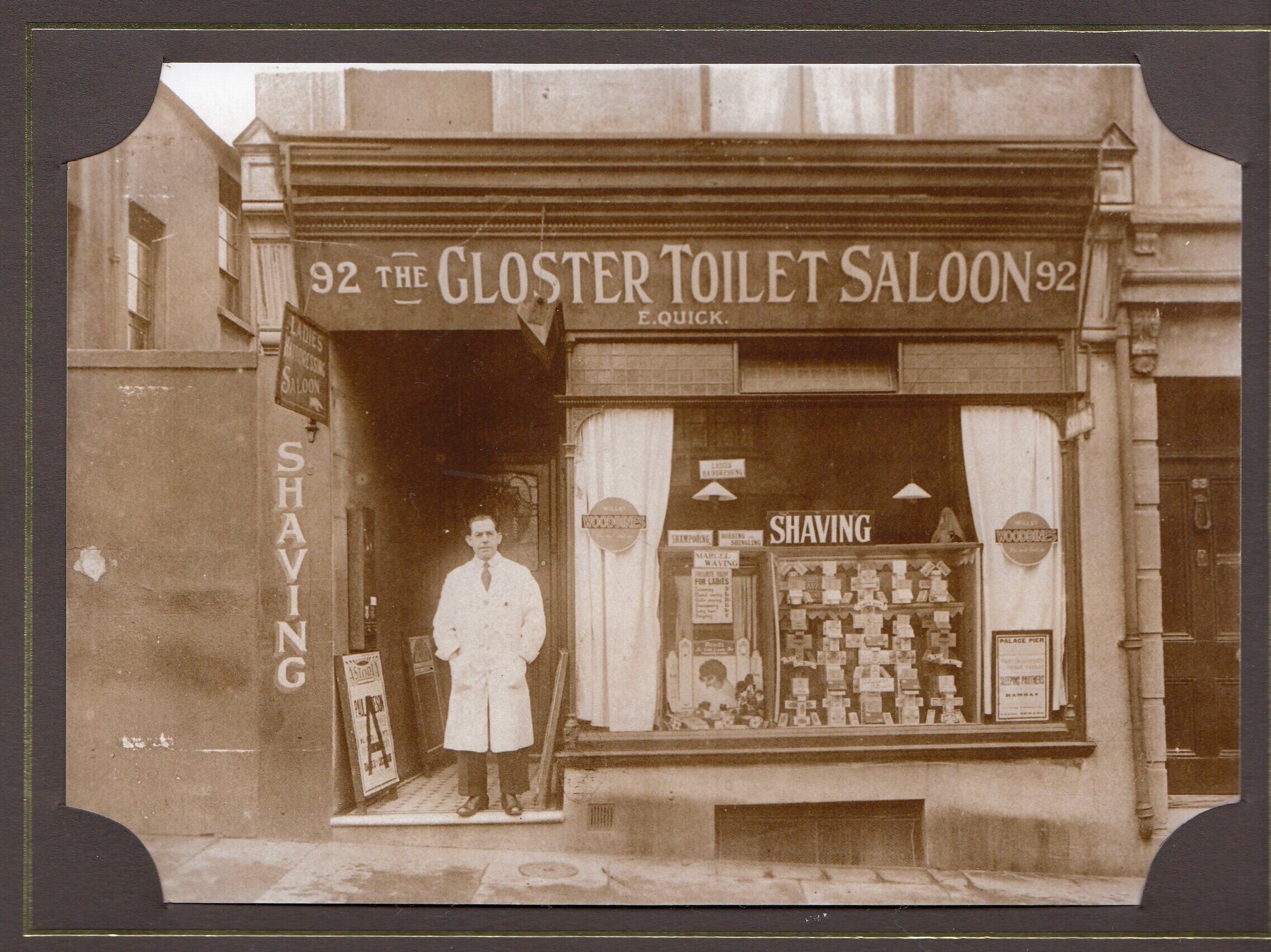Grandparents
Frederick Robert JARVIS (1865 - 1955)
My maternal grandfather Frederick Robert JARVIS was born on 30 October 1865 in Park Road, Clapham, Surrey and became a carpenter like his father, Robert Jarvis (1842 - 1915) and previous ancestors, who had generally lived in the Heathfield area of East Sussex over many generations. He grew up in the Wandsworth area of Surrey until 1873 when his whole family moved up to Kings Bromley and plied their trade there.
Frederick’s first job after leaving school was at Bridgeman’s in Lichfield. Robert Bridgeman had trained in Cambridgeshire as an architectural sculptor, a stone carver and stonemason, and readily found work at the cathedral when he moved to Lichfield in 1877. Robert established his own firm in the Stowe area of Lichfield in 1879, specialising in ecclesiastical and architectural work in wood, stone, alabaster and metal. The site in Quonians Lane still exists today.
Bridgeman’s in Quonians Lane (photo taken by Julie Graddon, June 2021)
Everyday Frederick would rise early to walk to Lichfield from the family home in Fradley, a distance of about 5 miles, in order to be at work for 6 a.m. The miners of the Cannock Chase area had to walk similar distances before labouring long hours down the pits, there being no public bus transport in those days; only the fortunate few possessed bicycles. I am 88 now and can imagine the hard lives that most people struggled through in those days.
In the article below, Frederick recalls:
“Before going to work, some of the men had rum and coffee at several hostelries which regularly opened at an early hour, particularly the Castle in Market Street and the old Windsor Castle in Dam Street, Lichfield. A rum and coffee cost 2 pence and a pint of beer 3 pence.” In the 1880s, a miner might earn perhaps 5 shillings (i.e. 60 old pence) per day. In the period from 1870 to the start of the First World War, beer and spirits accounted for 90% of the total amount spent on “intoxicating liquor”. Many believed it was this expenditure that prevented an overall improvement in the health and standard of living of the working class.
In the 15th December 1939 edition of the Lichfield Mercury, regular columnist J. W. Jackson told this story about the close proximity of Bridgeman’s and the Windsor Castle:
“Its (the Windsor Castle’s) backyard runs along the back of the workshops of Messrs R Bridgeman and Son, the well-known ecclesiastical sculptors, and it appears, years ago, the carvers in order to obtain liquid refreshment without leaving their work, ingeniously removed several bricks from the wall which separated the shop from the Windsor Castle, and through the aperture received bottles of stout or beer from the licensee (a lady at that time) at a certain time each morning and then replaced the bricks.”
Apparently, this arrangement worked for a long time until the men were caught out by Robert Bridgeman. In the article, Mr Jackson says the workers got around this setback by bringing bottles into the workshop in their wheelbarrows, storing the empties in their tool chests and returning them to the pub for a refill when the coast was clear.
Picture of Frederick Robert Jarvis from the 29 July 1955 edition of the Lichfield Mercury
Extract from the 15th December 1939 edition of the Lichfield Mercury
In 1892, Frederick Robert Jarvis married Sarah Jane Johnson of Orgreave Farm, Yoxall and they moved to Crewe, Cheshire, where he worked in the LMR Railway workshops to earn better money. My mother, Annie Jarvis (1893 - 1983), was born there and also her two sisters, Frances (1895 - 1983) and Edith (1897 - 1983), before the family returned to Fradley in 1901 to take over the Swan Inn, which was at the junction of the Trent & Mersey/Coventry canals. Subsequently William (1902 - 1978), Rose (1906 - 1992) and Arthur (1909 - 1986) were born there. Then, in 1919, he sold the Swan Inn to Lichfield Brewery for £700 and bought the Nags Head Inn and Farm, Burntwood, of 61 acres from Mrs. L Whitehouse for £3000.
My grandfather farmed in the old-fashioned way, right up to his death in 1955 and when I was exploring the farm with my uncles in 1942 and 1943, the crops he grew were wheat – cut, stooked in 6-8's to dry and eventually carted away to the rick-yard to be threshed later. There was also hay and mangols (large turnips) grown for winter feed for the 15 dairy cows he kept and whose milk was supplied to the “Crows Nest Dairy” at Lichfield. He also had 3 shire horses for ploughing and pulling the carts and other machinery.
All his Family were expected to help to run the busy Nags Head public house and the men had the farm work to attend to, as well. There was an enormous kitchen and brewery area about 30 foot x 60 foot, which had 6 to 8 wooden hogshead barrels (52 gallons) reposing on stands at the far end, ready for filling glasses with beer for the customers. Besides talking and smoking with each other in the Saloon or Public bar (cheaper beer), they only had domino's or playing cards to occupy themselves. Also, in that period, there was no food or nibbley things, like crisps or peanuts.
All this routine continued until October 1955, when my grandfather died and the Inn-activity and house were sold to a commercial Brewery firm and the farm buildings were demolished and the land sold to a nearby local farmer. In the summer of his final year, my grandfather gave an interview to a reporter from the “Lichfield Mercury”; he assured the reporter that he was in “Good Health” but sadly he died 3 months later from diabetic gangrene.
First part of the article about Frederick Robert Jarvis from the 29 July 1955 edition of the Lichfield Mercury
Continuation of the article about Frederick Robert Jarvis from the 29 July 1955 edition of the Lichfield Mercury
Ray Derry
My Grandma Emily Portman
Well I only ever knew my Grandma (my Mom’s Mom); my other grandparents had all passed away before I was born, I never even knew their names until I started researching my ancestry.
My Grandma Emily Portman née Westwood lived in Birmingham and was born 4 February 1898 at 9, House Row, Chase Terrace, Burntwood. Emily lived in the Burntwood area until she went into service in Birmingham and married my Granddad. (Emily is the great granddaughter of Sarah Westwood, the last woman to be hanged in Stafford; whether Grandma knew about Sarah we will never know).
I have some lovely and very special memories of the times I spent with my Grandma. Here are just a couple.
Every school holiday my other 2 cousins and I would spend 2 weeks of the summer holidays with Grandma in Kingstanding, where she lived at that time. She would made us walk everywhere and we had many expeditions into Sutton Park which was great fun; of a the night time we would sit on floor in front of the coal fire and crack nuts to eat using her heavy solid Black Iron, which I still have this.
On Sunday’s she would always take us to Sunday School at the little chapel on the corner of Kilburn Road.
Most Christmases she would come over and stay with us in Cannock, staying for a week or two; she came for other stays during the year and also came on holidays with us.
When she was over with us, we would always take her back to where she lived; she loved these trips. She would always recall the cottages by the Redmore Pub, which was where she lived, but her cottage was no longer there.
Emily Westwood and family
Grandma always recounted and told us this tale about the time she and her sisters were in their Sunday School Anniversary dresses. As children, they loved to roll down the hill at the back of their cottage (Gentleshaw Common) and they decided to roll down the hill that day, getting their Anniversary dresses dirty. Their Mom was not pleased, she put each of them fully clothed into the dolly tub to clean their clothes, so they could go on the Anniversary clean.
Me and my Grandma Emily Portman on one of our car rides together.
When she was 80, her son and daughter who lived in Australia paid for her to visit them, so she flew to Australia all by herself. She had never flown or been so far from home before; no one wanted her to go on her own but she insisted she was going to, and she did!! We often wonder now, how did she do it?
Grandma was a lovely quiet person, and very special to me, I still miss her now.
I had many adventures with her, too many to write down, but lovely memories to treasure.
Grandma passed away in 1984 at the age of 86. She was at our house in Cannock at the time. We always said she came home to where she was born.
Linda Downes
When Grandma moved to Chelmsley Wood, and I had learnt to drive, I would visit her regularly and take her on many rides out, which she loved. I did get lost on one of those journeys when Grandma spotted a No. 28 bus which she knew went right to her home; she said follow that bus so from Birmingham town we followed the No. 28 bus, stopping with it at every bus stop. Ah, we had so much fun that day and on many others.
Emily Portman née Westwood, my Grandma
Charlie Roland Sylvester 1901 – 1974
I am writing about my maternal Grandfather, a Burntwood-born man and a very special person for me. I guess we would all like to spend a day or a few hours with someone who has passed and, along with my Mother, he would be up there with her.
My Grandmother, Alice, died 10 years before I was born in 1942 leaving Charlie a widower with two children – my Mum, Dorothy, aged 16 and her younger brother, William, aged 11. Charlie did remarry in 1943 to my Grandmother's younger sister Margery. I always called his second wife Auntie as she indeed was my Great Aunt and my Mother's much loved Aunt. Because my Mum always knew her as Auntie it passed to me to call her the same, so I would always refer to this couple as Granddad and Auntie.
The 1943 marriage of Charlie Roland Sylvester and Margery Jane Harvey.
In the early weeks of his life, Charlie lived in Chase Terrace along the Cannock Road in Bridge Cross Cottage. At some point, the family moved to Highfields House in Burntwood when my Great Grandfather purchased the property. The house is still there and it's the one on the wedding photo of Charlie and Alice in 1925.
Charlie and Alice's wedding on 26 December 1925
Alice Rene Harvey and Charlie Roland Sylvester
Why was Charlie so special? I was an only child and when we visited every fortnight, on a Sunday, Granddad always had time for me. I played countless games of chess with him and draughts and cards. He loved playing cards and even developed his own game of patience. He loved riddles and puzzles and always knew one to tell me. He was a miner and, at some point, moved from Burntwood to Nuneaton to get work. It is said, in the family, his desire to move was centred around his two children for whom he wanted better prospects in education and employment. I've never been able to find out why he believed this or if feelers were put out to find miners for the Griff Clara mine in Nuneaton and if any incentives were offered.
Sometimes I would go over to Bedworth (near Nuneaton) to stay for a few nights, usually during school holidays. Granddad would be working and he usually came home, after his shift, around lunchtime. He would sit and play a few rounds of patience and then have a nap on the living room floor with just a cushion under his head. The big Bush push button radio would be on and the shipping forecast would be listened to, and The Archers. He had time later on to talk and show me the garden and involve me with all the crops he grew. The raspberries behind the outhouse were particularly delicious. He could drive, and had a little Ford Prefect, and occasionally he would drive us home to Coventry otherwise my Mum and I would have to catch two buses home. I expect he learnt to drive during the war as he was an Air Raid Warden in Nuneaton. During the bilberry season he and Auntie would drive over to Staffordshire to pick and bring them home to make pies and jam. He was also a member of St John's ambulance, in the Nuneaton area, and was the one to go to in the family for first aid. People who lived near to them also valued his first aid experience, he was the first port of call for many.
Charlie Sylvester (2nd right on the front row) St John's Ambulance
I remember they bought one of the first home refrigerators and Granddad was like a kid with a new toy. Strangely it was a gas one – never caught on! He liked making ice cream in the small ice compartment and we tasted his latest flavours. When he washed up he left the hot water tap running constantly and washed everything in copious amounts of hot water. Granddad and Auntie had a son David; he was only 6+ years older than me so was like a big brother but he was really my Uncle. David took me bird egging one day, it was awful. Granddad found out and David was in a lot of trouble, for doing it in the first place and secondly for taking me with him.
Granddad taught me the ethos of giving presents. He always said the best present was something you really wanted and it didn't have to cost the earth. This played out in a present my Mum bought him for his birthday. He had always wanted an umbrella so we bought him one. He was so happy with it, his joy is something I will always remember.
4 Generations, Dorothy, Gran, Margaret (Baby) and Granddad Charlie
Dorothy, Charlie and Margaret, 3 generations, 1965
Whenever we went over to Bedworth, family members would pop in and out and at Christmas and special occasions there would be many people there and a table 'groaning' with food. The dining room would be the games room and anyone could join in a card game, with Granddad officiating. If there were lots of people, 'Newmarket' would be the game played, betting on 'horses' and the kitty in the middle was in pennies. Granddad would always know which cards had been played and he kept an eagle eye on anyone who hadn't played the lowest card in any suit to lead and which cards were what he called 'stoppers' in the spare hand that wasn't played. Wonderful times.
Sadly he died when I was 22 and a year after we were married. He had been ill for sometime with heart problems. We had booked a weekend in Paris and his funeral would take place during that holiday. We wanted to cancel and be there but many members of the close family said not to and he would have wanted us to go to Paris. Yes, that would have been his wish and I knew that. I am certain he was a clever man and probably didn't realise his potential but he was happy with his lot.
Margaret Stead
Charlie and Margery with the happy couple at Margaret & Anthony’s wedding in 1973.
Granny White
Readers of the Burntwood Family History Group Journal will be familiar with the extracts that have appeared over the years from the Boer War and Great War diaries kept by Charles William Graddon, my paternal grandfather. It is therefore high time I redressed the balance and reminisced about my grandparents on my mother’s side of the family.
Sadly, I don’t remember my grandfather William White, he died in 1941 at the age of 70, just short of 7 years before I was born. When he and my Grannie, Nellie Wilson, married at St. George’s Church, Walsall on 28 August 1897, William gave his occupation as gardener. Much later, on the 1939 census, he described himself as a retired market gardener but, in between, the 1901 and 1911 censuses show him working as a hewer in the local coal mines. The reality was that he worked there primarily so he could have access to coal to heat his flower beds through the winter months, generating the early flowers that Granny White sold in her shop.
Granny White
William and Nellie White



























